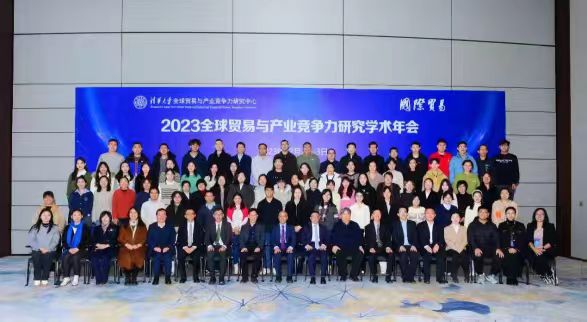
The participants at the 2023 Academic Annual Conference on Global Trade and Industrial Competitiveness
The 2023 Annual Conference on Global Trade and Industrial Competitiveness, jointly organized by the International Trade Journal of the International Trade and Economic Cooperation Research Institute of the Ministry of Commerce and the Global Trade and Industrial Competitiveness Research Center of Tsinghua University, was successfully held at the School of Economics and Management in Tsinghua University from Dec. 2 to 3.
Yu Zirong, Deputy Dean of the Institute of International Trade and Economic Cooperation of the Ministry of Commerce, and Wang Hongwei, Member of the Standing Committee of the CPC Committee and Vice President of Tsinghua University, attended the annual meeting and delivered speeches. Nine experts and scholars, including Yu Miaojie, deputy of National People's Congress, Deputy Secretary of the CPC Committee, and President of Liaoning University, delivered a keynote speech. Professor Li Donghong from the School of Economics and Management at Tsinghua University and Deputy Director of the Global Trade and Industrial Competitiveness Research Center at Tsinghua University, as well as Wang Jian, Director of the Media Center of the International Trade and Economic Cooperation Research Institute of the Ministry of Commerce and President of the Intertrade magazine, presided over the opening ceremony, the keynote speech section of the conference, and presented awards to the authors who won the Outstanding Paper Awards at the conference.
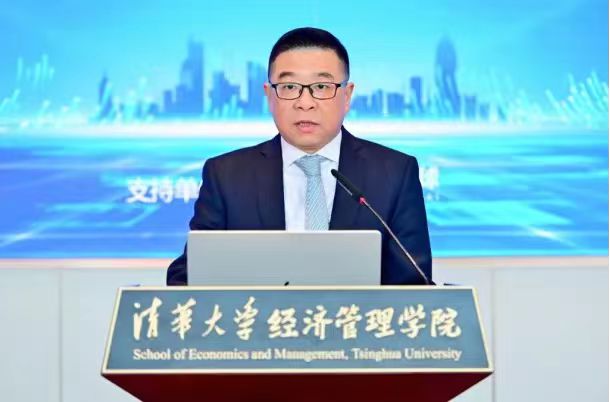
Deputy Dean Yu Zirong delivering a speech at the conference
In his speech, Yu Zirong stated that during the past 40 years of reform and opening up, China's economy has created a growth miracle that has shocked the world, becoming a large world economic and trading power. The important foundation for China to build a strong trading country is to build a new open economic system with wider fields, more comprehensive and deeper levels, and to participate more deeply and actively in global governance and international economic and trade cooperation, so that foreign trade can continue to become an important driving force for economic development. The fundamental symbol of building a strong trading nation is to gradually form a Chinese paradigm that can lead the development of foreign trade theory and practice in various countries, based on promoting innovative development of trade system models and formats, thereby effectively enhancing China's influence and discourse power in the field of global economic governance and trade rules. The construction of a strong trading country and industrial development complement and promote each other. In the current complex and profound international changes and new situations of industrial and technological innovation, this year's academic annual conference is guided by the implementation of the spirit of the 20th National Congress of the Communist Party of China and against the background of building a new development pattern of domestic and international dual circulation and mutual promotion. It is timely to conduct in-depth research on major theoretical and practical themes related to the construction of a trading power and the enhancement of industrial competitiveness.

Wang Hongwei, member of the Standing Committee of the Party Committee and Vice President of Tsinghua University, delivering a speech at the conference
In his opening speech, Wang Hongwei stated that the Report to the 20th National Congress of the Communist Party of China proposed that "education, science and technology, and talent are the fundamental and strategic support for comprehensively building a socialist modernized country". He further states that, "we must adhere to the principle that science and technology are the first productive force, talent is the first resource, and innovation is the first driving force. We must deeply implement the strategies of revitalizing the country through science and education, strengthening the country through talent, and driving development through innovation, open up new fields and tracks for development, and continuously shape new driving forces and advantages for development". Tsinghua University has always maintained an open attitude, guided by serving the major strategic needs of the country, strengthened basic research, improved the university innovation system, actively attracted talents, carried out high-level international exchanges and cooperation, firmly moved towards the forefront of world-class universities, and provided talent and intellectual support for the implementation of major national strategies and economic and social development. Currently, China is moving from a trading powerhouse to a trading powerhouse, and the construction of China's modern industrial system is steadily advancing. This academic annual conference has provided a great academic exchange platform for in-depth discussions on important topics such as trade and industrial development, which is a very beneficial attempt. The theme report and parallel forum discussion of the academic annual conference have gathered numerous top experts and scholars in relevant research fields in China. The theme focuses on key issues in current trade and industrial competitiveness research. It is hoped that attending scholars and teachers can strengthen cooperation, share innovative achievements, promote the development and innovation of related disciplines, and make greater contributions to enhancing China's trade and industrial competitiveness and promoting global economic development through the conference.
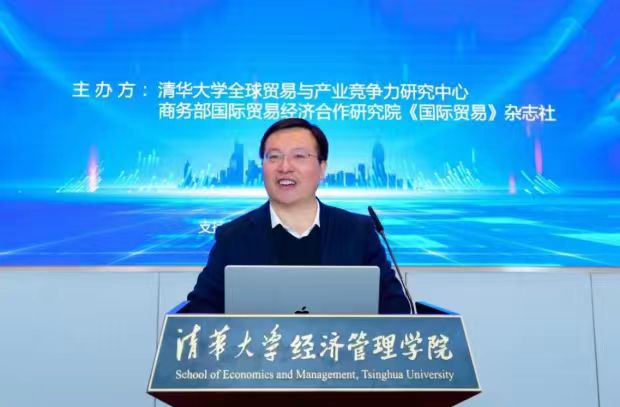
Li Donghong presiding over the opening ceremony of the conference
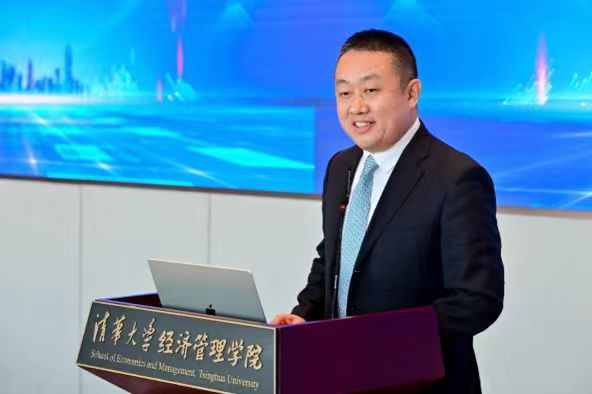
Wang Jian presiding over the keynote speech section of the conference
In the keynote speech section of the conference, nine invited scholars and experts presented insightful research results and shared academic views on topics such as building a new pattern of comprehensive opening up to the outside world, reshaping the global value chain, reforming the international monetary system, building a strong trading nation, enhancing China's foreign trade resilience and competitiveness, expanding imports, e-commerce platforms and enterprise exports, social science theory and policy research, and international competitiveness of emerging industries.
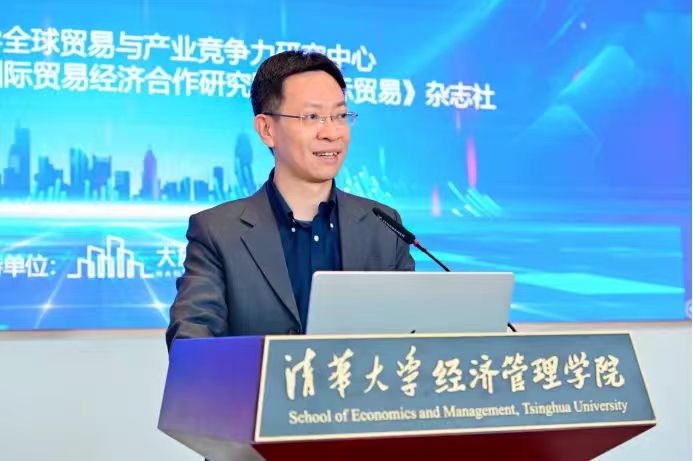
Yu Miaojie delivering a keynote speech at the conference
Yu Miaojie, deputy to the National People's Congress, deputy secretary of the CPC Committee and president of Liaoning University, elaborated on the process of China's opening up and economic globalization, as well as the development trend of the global trade pattern. He also discussed the construction of a new pattern of comprehensive opening up that needs to move from factor-oriented opening to rules, regulation, management, standards, and other institutional opening. It also needs to put forward suggestions on the construction of a new pattern of comprehensive opening up from six aspects. It includes diversification of export destinations, expansion of import scale, characterization of service trade, "going out", "going in" and "going up" of foreign investment, differentiated development of the "the Belt and Road", and promotion of regional economic and trade cooperation.
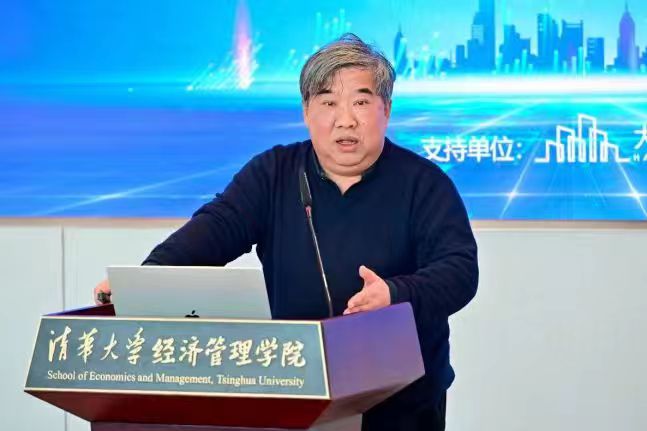
Lin Guijun delivering a keynote speech at the conference
Lin Guijun, a professor at the University of International Business and Economics and former vice president of the university, evaluated the current state of the global value chain and summarized the changes in the global semiconductor market structure and production mode over the past 40 years, focusing on the theme of the reshaping of the global semiconductor value chain. He reviewed the semiconductor trade conflict between the US and Japan in the 1980s and the trade conflicts between the US and EU, and South Korea and Taiwan, China since the 1990s, as well as the semiconductor trade disputes China has faced in the 21st century. He analyzed the reasons and essence of the current global semiconductor trade conflicts, stating that competition in the semiconductor industry is reflected in the competition of various value chain links. He encouraged scholars in attendance to conduct in-depth research on the development priorities of China's chip industry.
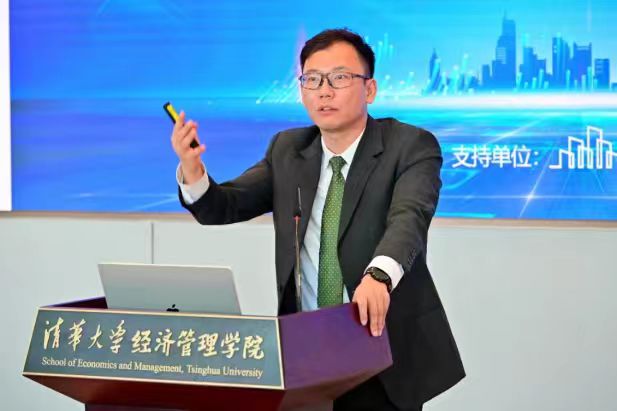
He Ping delivering a keynote speech at the conference
He Ping, Deputy Dean of the School of Economics and Management at Tsinghua University and Director of the Global Trade and Competitiveness Research Center at Tsinghua University, introduced the topic of international monetary system reform. He discussed the traditional horizontal division of labor in the industrial chain system and its formation mechanism, as well as the current pattern of the international monetary system and the main structure of international capital flows. He believed that the subprime crisis and the COVID-19 pandemic have exposed the shortcomings of the traditional division of labor in industries and the international monetary system. The financial game behind the Ukrainian crisis has accelerated the reconstruction of the global financial system. Both the international monetary system and global industrial division of labor require reforms. He analyzed the new directions of the transformation of the international financial system from three aspects: capital flows brought by the Belt and Road Initiative, internationalization of developmental finance, and central bank digital currencies.
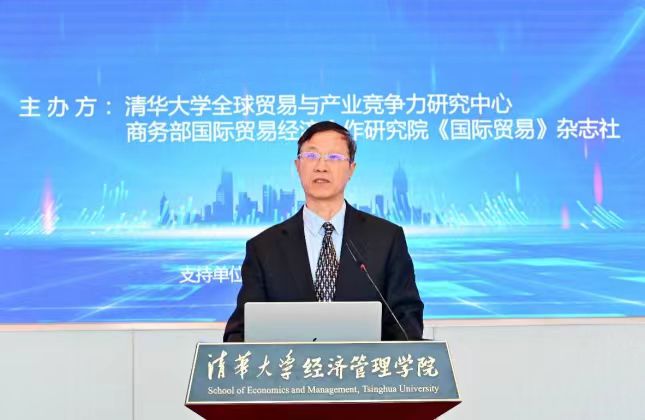
Li Gang delivering a keynote speech at the conference
Li Gang, Vice President of the China International Trade Association, introduced the situation of China's transition from a trading power to a trading power. Using relevant indicators in 2008, 2014, and 2022 as examples, he evaluated the construction process of China as a trading power. He discussed several trend issues that need to be addressed in the construction of a trading power, such as the accelerated evolution of global value chain restructuring, the emergence of global supply chain crises, and the expansion of negative impacts of trade substitution and investment transfer. He proposed the path and main direction for China to accelerate the construction of a trading power from promoting the optimization and upgrading of goods trade, promoting innovative development of service trade, developing digital trade and green trade, and other aspects.
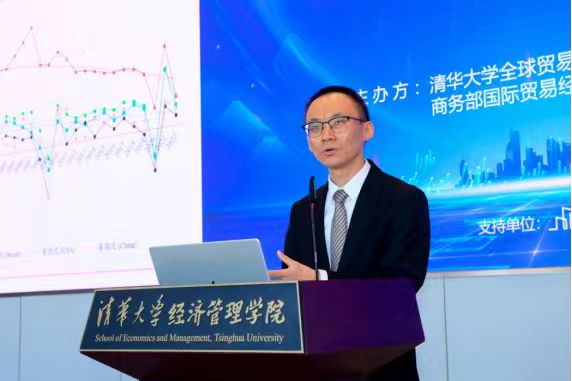
Liang Ming delivering a keynote speech at the conference
Liang Ming, Director of the Institute of Foreign Trade at the Institute of International Trade and Economic Cooperation of the Ministry of Commerce, introduced how to understand the concepts of trade resilience, trade competitiveness, RCA index, and trade share in the context of anti-globalization and re-globalization of China's foreign trade. He pointed out that the traditional measurement of trade competitiveness based on the level of RCA index and trade share is flawed and detailed the current world service trade The statistical results of cross-border direct investment, China's exports of goods with high RCA index, and the international market share of imported goods from major countries have analyzed and judged the future trend of China's foreign trade competitiveness.
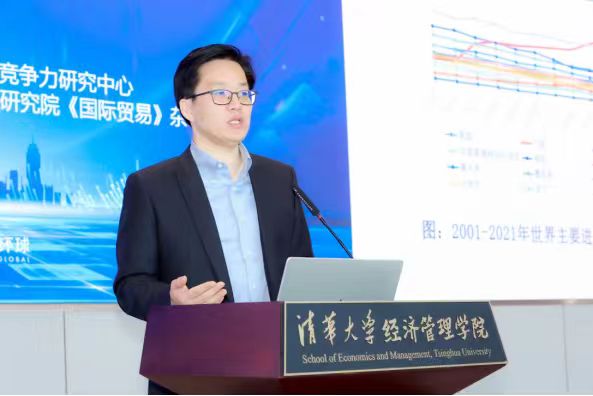
Wei Hao delivering a keynote speech at the conference
Professor Wei Hao from the School of Economics and Business Administration of Beijing Normal University and Director of the Department of International Economics and Trade introduced the significant changes in China's foreign trade policy. He introduced the main measures taken by China to actively expand imports from the aspects of improving import facilitation, increasing import liberalization, building import platforms, and developing new import formats and models. He analyzed the importance and necessity of expanding import trade in China, and with detailed data, it reviewed the changes in import scale, import dependence, and consumer goods imports between China and other major economies, and elaborated on the adjustment direction of China's import trade policy in the future.
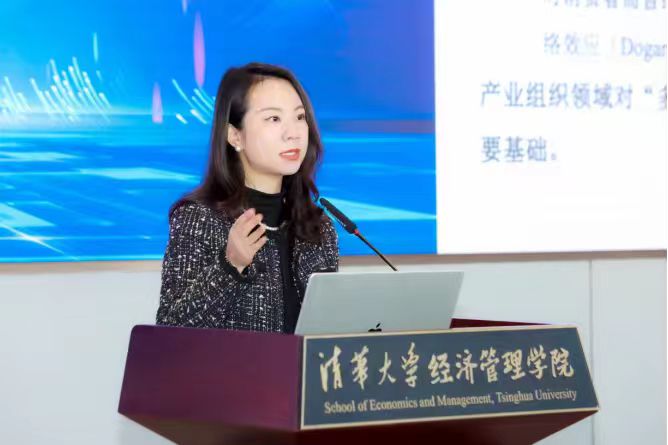
Lyu Yue delivering a keynote speech at the conference
Professor Lyu Yue from the School of International Economics and Trade at the University of International Business and Economics, and Executive Dean of the Institute of Global Innovation and Governance (Strategic Research Base of the Ministry of Education), shared her team's latest research findings on the relationship between dual e-commerce platforms and Chinese enterprise exports. The research results indicate that both domestic and cross-border e-commerce platforms will significantly promote the growth of enterprise exports and the export growth brought about by joining dual e-commerce platforms is significantly higher than that of a single platform. Scale effect and intermediate product effect are the two major channels through which e-commerce platforms participate in influencing enterprise exports. Enterprises located in the central and western regions are more able to leverage e-commerce platforms to achieve export growth compared to local enterprises. The relevant research conclusions provide a possible path of support for how to better utilize two markets and two resources under the new development pattern of "dual circulation".

Chen Qi delivering a keynote speech at the conference
Chen Qi, a professor at the School of Social Sciences at Tsinghua University and deputy director of the Center for Global Trade and Industrial Competitiveness at Tsinghua University, analyzed the differences between theoretical and policy research from the perspectives of research objectives, analytical principles, effectiveness standards, communication objects, research difficulties, time urgency, and innovation requirements. She pointed out that theoretical research has repeatability and falsifiability, and its purpose is to reveal and explain social laws, pursuing the universality of interpretation. Policy research is normative, with the aim of finding effective measures under established goals and pursuing their effectiveness. In addition, Chen Qi also analyzed China's international situation and foreign strategy and proposed theoretical and policy considerations on China US relations.
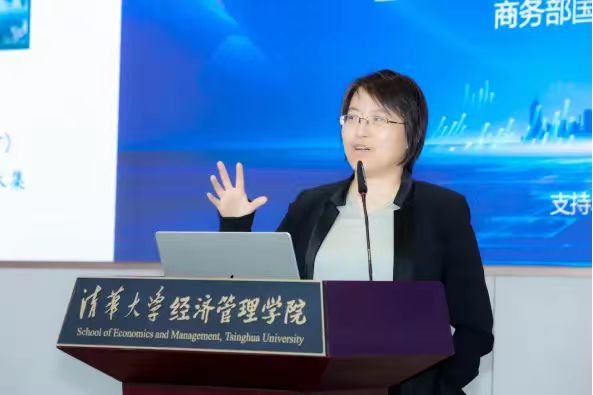
Jiang Hong delivering a keynote speech at the conference
Jiang Hong, Deputy Researcher and Deputy Director of the Multinational Corporation Research Office at the Institute of Industrial Economics, Chinese Academy of Social Sciences, analyzed the differences in perspectives between international trade theory and management theory in studying the international competitiveness of emerging industries and elaborated on the policy mechanisms of governments in developing countries to promote the enhancement of competitiveness in emerging industries. He also elaborated on specific measures to enhance industrial competitiveness through "coordinated intervention" in shaping common strategic missions, shaping mission oriented consistent actions, creating innovative and profitable market spaces, and creating a controlled competitive landscape.
There are five parallel sub forums in the annual meeting, which are respectively "value chain, industrial chain, supply chain security", "deep participation in global industrial division and cooperation", "digital economy and digital trade", "foreign investment absorption, foreign investment and the construction of the the Belt and Road," and "trade rules and high-quality development of foreign trade". The authors of the relevant papers shared their latest research achievements in the relevant research fields in the sub forums, focusing on the aforementioned hot topics. Xu Na, Editor in Chief of International Trade, Li Xiuxiang, Professor at the School of International Economics and Trade of Jiangxi University of Finance and Economics, Li Xiuting, Deputy Editor in Chief of International Trade, Zhang Meng, Researcher at the Nanjing Institute of Agricultural Mechanization of the Ministry of Agriculture and Rural Affairs, Feng Xiaoling, Professor at the School of Shipping Economics and Management of Dalian Maritime University, Wang Yidong, Associate Researcher at the Law Research Institute of the Guangdong Hong Kong Macao Greater Bay Area of Guangzhou University of Business, and Li Hongbing, Professor at the School of Economics and Management of Beijing University of Posts and Telecommunications Dai Lihua, Associate Professor at the School of Economics of Shandong Normal University, Bai Guangyu, Associate Researcher at the Institute of Foreign Trade at the Institute of International Trade and Economic Cooperation of the Ministry of Commerce, and Xu Baochang, Associate Professor at the School of Economics of Qingdao University, respectively served as commenting experts for five parallel sub forums, providing in-depth and detailed comments on relevant papers.
